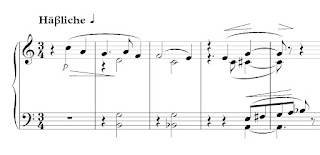Dear person,
We had a little mishap, some weeks ago. I had been hoping to buy the score of
Hans Otte’s 1960 Daidalos from you, but since you don't consider this work as part
of the current repertoire, and there are no resources to examine the materials in your archive, you could not but disappoint me.
These are difficult times. To think of how UE was once supported by “important personalities from the banking sector”, as I read on your website, and how the company name “was both program and strategy: it simply meant the whole world of music, in which one had some catching up to do”... Especially noteworthy, I find, is the era of director Alfred Schlee, showing a deep commitment to modernist music.
I always had great sympathy for UE’s efforts to promote such music. Perhaps
the first score I ever bought from you – Boulez’ Sonata No. 3 – was not
as practical as the pianist in me had wished for (pretty colours, but I could just
never get it to stay upright against the music stand), especially at that price. Fortunately,
it looks great hanging on the wall.
Despite some less than happy collaborations, UE and I have enjoyed at
least a joint faith in the future of music that can be perceivced as difficult. In my consecutive
careers as pianist and concert organiser, I have put countless UE scores on the
stage. Now I am a researcher, and I find myself potentially aligned with UE’s
fate, or at least with its erstwhile ambitions, once again.
A little while ago, the New York Times published the news of how science doesn’t anymore provide the breakthrough research results that society needs in order to thrive. The study criticised ‘incremental science’. One of the authors is a specialist in "strategic management and entrepreneurship", bringing to my mind the image of research managers studying
ways to increase the impact of their employees’ work. It made me think of some directors of research
institutions that I have known, telling their staff that they were not
impressed by research showing how bar six in Berio’s violin Sequenza contains a
mistake. It might just about impress a violinist, but it doesn’t change society. So why spend society's money on it, right?
The NYT article mentioned Einstein’s breakthroughs as being more typical
of a past that we don’t seem to connect to anymore. But some of Einstein’s efforts
turned out to be proven only relatively recently, didn’t they? So it can be argued, like people such as Schlee did, that disruptions à la Schönberg's don’t necessarily become apparent or have a societal impact straight
away, either.
Perhaps that moment is upon us, however. I am writing all this because of another bit of news, also about
societal changes. As it seems, some of Roald Dahl’s books are being rewritten to
suite present-day sensitivities. I can imagine some artists exclaiming that we
should leave the past as it was, and that we won’t learn from it if we
rewrite it. But we could just as well argue that we rewrite history as soon as
we research it. And what's wrong with having multiple perspectives at the same time? If a Dahl story is well rewritten, then it will reach a larger audience, so that a larger number may get excited to go and find the inappropriate original. An enterpreneur would call it a win-win situation.
Anyway, I just got this idea. What if we rewrite Schönberg? Adjusting
his notes to the prevalent taste of today's audiences might not just make
his music more “schön”, it might provide us with a huge opportunity for employing re-composers and publishing their work. And we could disrupt at least the
modernist part of the musical society. Imagine all the music from your
catalogue that we could finetune! We might even make enough money to pay someone to
go look for that Daidalos score in your archive. Maybe a simple overhaul is all it needs to be rescued from its current oblivion.
To show my genuine interest in this idea, I took the liberty of trying it
out on one of your company's most succesfull modernist output: Schönberg’s opus 11. I only
took the first few bars, as this is what researchers have traditionally limited
themselves to. (In any case, the whole work is also mostly known only to white male pianists, but that is a problem in itself, worthy of a differently focussed research
application. It is perhaps best to be disruptive in an incremental way.)
Herewith, I include my rewrite for you to evaluate. There are details to discuss, of course - the f#, for instance - but we can deal with semantics after we agree on the fundamentals. Let me know how it strikes
you. I feel confident there is material for an EU application.
I look forward to hearing back from you.
Meanwhile, I remain yours with my best regards.

No comments:
Post a Comment